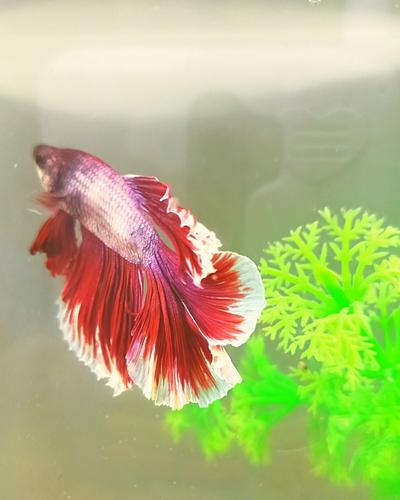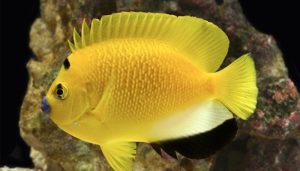Have you ever wondered, How Can Betta Fish Breathe Air Surface? While most fish rely solely on their gills to extract oxygen from water, bettas are a unique exception. These stunning, vibrant creatures possess a remarkable survival mechanism that sets them apart in the aquatic world.
Whether you’re a seasoned aquarist or just starting your fishkeeping journey, understanding this intriguing trait will not only deepen your appreciation for bettas but also help you care for them better. So, what makes bettas so special? Let’s dive in!
The secret lies in their labyrinth organ—a specialized structure that allows betta fish to breathe atmospheric air.
Unlike regular gills, this organ enables them to survive in low-oxygen environments, such as shallow ponds or stagnant waters.

By gulping air directly from the surface, bettas can thrive where many other fish cannot. This unique adaptation not only enhances their resilience but also makes them a fascinating species to observe and care for.
Table of Contents
ToggleCan Betta Fish Breathe Air Surface?
Yes, betta fish can breathe air at the surface. Unlike many other fish that rely solely on their gills to extract oxygen from water, bettas possess a specialized labyrinth organ that allows them to gulp air directly from the surface.
This adaptation is particularly beneficial in their native habitats, such as rice paddies, where water levels can fluctuate, and oxygen levels might be low. When bettas swim to the surface for air, they take gulps of oxygen which they can then use, making them quite unique among fish.
This ability to breathe air is vital for the survival of bettas, especially in environments with poor water quality where dissolved oxygen may be scarce. In a properly maintained aquarium, bettas will often swim to the top of the tank to extract the oxygen they need.
It is essential for fish keepers to understand this behavior to ensure that their bettas have the opportunity to access the surface air regularly. Providing a suitable environment, such as a well-planted tank, can encourage this natural behavior and keep the bettas healthy.
Do All Bettas Breathe Air?
Not all bettas breathe air in the same manner, but the majority of them do possess the ability to utilize their labyrinth organ for this purpose.
While most bettas, including the popular Siamese fighting fish and paradise fish, have developed this adaptation, there can be variations in their reliance on air based on their environment and individual health.
Bettas that are kept in poorly oxygenated water may frequently go to the surface to breathe air, making it essential for aquarists to monitor their tank conditions.
Understanding that all bettas can breathe air, yet their frequency of air gulping might differ, is crucial. Some bettas may prefer to extract oxygen from the tank water using their gills, especially if the water quality is optimal.
However, if a betta fish is consistently swimming to the surface for air, it may indicate poor water conditions or an underlying health issue. Therefore, maintaining good water quality is vital for keeping bettas healthy and ensuring they are not overly reliant on surface air.
Can Betta Fish Breathe Without Water?
Betta fish cannot breathe without water for extended periods. While they can gulp air from the surface, they still need to be submerged in water to function properly.
The gills of a betta fish are designed to extract oxygen from water, and prolonged exposure to air can be detrimental to their health. If a betta is out of water for too long, it risks suffocation and severe stress, leading to potential death.
However, it is important to note that bettas can survive brief periods out of water, such as when they accidentally jump out of their tank or during transfers. Their labyrinth organ allows them to breathe air temporarily, but this should never be relied upon as a regular practice.
Betta fish need a stable aquatic environment to thrive, and their natural behavior often includes a balance of both breathing air and using their gills to extract oxygen from the water. Thus, ensuring proper water conditions and tank maintenance is crucial for their overall health.
Can Betta Fish Live Without an Air Filter?
Bettas can survive without an air filter, but it’s not ideal for their long-term health. While they are capable of breathing surface air, a filter plays an essential role in maintaining water quality by circulating and aerating the tank.
Without a filter, harmful toxins can build up, leading to poor water quality, which can stress the fish and diminish their ability to thrive. Bettas are particularly sensitive to changes in their environment, and stagnant water can significantly affect their well-being.
In a tank without an air filter, regular water changes become even more critical. Fish keepers must monitor parameters such as ammonia, nitrite, and nitrate levels closely to ensure a healthy environment for their bettas.
Additionally, incorporating live plants in a planted tank can help improve water quality by naturally filtering toxins. While bettas can survive without an air filter, providing optimal conditions with a filter or regular maintenance is crucial to ensure their health and happiness in the aquarium.
How Do I Know If My Betta Is Getting Enough Oxygen?
Determining if a betta fish is getting enough oxygen can often be observed through their behavior. If your betta frequently swims to the surface to gulp air or appears lethargic and inactive, it may indicate insufficient oxygen levels in the tank.
Healthy bettas typically exhibit active behavior, swimming around their aquarium and exploring their environment. If they seem to be gasping at the surface or spending extended periods near the top of the tank, it could be a sign that the oxygen levels are low.

Additionally, monitoring water parameters is essential to assess the overall health of the betta and the environment. Poor water quality, such as high ammonia or nitrate levels, can affect oxygen availability.
Regularly testing the tank’s water and ensuring proper filtration can help maintain a suitable atmosphere for your betta.
If you notice signs of oxygen deprivation, such as rapid gill movement or erratic swimming, it’s crucial to take immediate action to improve water conditions and provide your betta with the oxygen it requires to thrive.
How Long Can a Betta Survive Out of Water?
Bettas can survive out of water for a brief period, generally around 15 to 30 minutes, depending on the conditions. However, prolonged exposure can lead to significant health risks, including suffocation and stress.
Their labyrinth organ allows them to breathe air, but this adaptation is not a substitute for being submerged in water. If a betta fish is out of water for too long, it will likely struggle to return to its aquatic environment and may succumb to health issues.
In situations where a betta jumps out of its tank, immediate action is necessary to return it to the water. The quicker the betta is placed back in its aquarium, the better its chances of recovery.
Fish keepers should take precautions to prevent such incidents, ensuring that tank lids are secure and avoiding abrupt changes in a betta’s habitat. The health and safety of your betta depend on maintaining a stable environment where it can access both water and air as needed without prolonged exposure to air.
Commonly Asked Questions about How Do Betta Breathe Air Surface (FAQs)
How Can Betta fish breathe air?
Betta fish, also known as Betta splendens, can breathe air. They have a special organ called the labyrinth organ that allows them to absorb oxygen from the air, which is why they often come to the surface of the water to get some air.
Do I need to worry about water quality for my Betta fish?
Yes, water quality is crucial for the health of your Betta fish. Poor water quality can lead to stress and illness, so it’s important to maintain a clean fish tank and regularly check parameters like ammonia, nitrite, and nitrate levels.
How often should I change the water in a Betta fish tank?
It’s generally recommended to change 25-50% of the water in a Betta fish tank weekly to maintain good water quality. This helps to remove waste and toxins that can build up.
Can male Betta fish live with other fish?
Male Betta fish are territorial and can be aggressive, especially toward other males. However, they can sometimes coexist with certain types of fish, like other fish species of tetra or angel fish, if the tank is large enough and has plenty of hiding spots.
What size tank is best for a Betta fish?
A minimum of a 5 gallon tank is recommended for a Betta fish. Larger tanks provide better water quality and more room for swimming, which contributes to a better experience for your fish.
How can I tell if my Betta fish is healthy?
Healthy Betta fish will have vibrant colors, clear eyes, and will be active and curious. Look for signs of distress, such as staying at the bottom of the tank, clamped fins, or faded coloration, which may indicate poor health.
Why does my Betta fish go to the top of the water?
Betta fish often go to the top of the water to breathe. Since they can absorb oxygen from the air, they will come to the surface regularly, especially if the oxygen levels in the tank and the water are low.
What should I feed my Betta fish?
A balanced diet for Betta fish includes high-quality pellets specifically designed for Betta fish, as well as occasional treats like freeze-dried or frozen foods (such as bloodworms or brine shrimp) to enhance their diet.
Can Betta fish live in fish bowls?
While Betta fish can survive in small environments like fish bowls, it is not ideal. Fish bowls usually do not provide sufficient space or water quality, and a proper tank setup is recommended to ensure the health and well-being of your Betta.
Conclusion
Understanding how betta fish breathe air is vital for any fish enthusiast or aquarist. These unique labyrinth fish have adapted to their environments, allowing them to gulp air from the surface, but they still require a well-maintained aquatic environment to thrive. Ensuring proper water quality, observing behaviors, and providing suitable tank conditions can significantly impact a betta’s health and longevity. By knowing about how Can Betta Fish Breathe Air and their needs, enthusiasts can create a thriving habitat where these beautiful fish can live happily and healthily.
You might also like
- Do Betta Fish Need Air Pump? (5 Reasons You Should Get one)
- Do Betta Fishes Sleep: Top 10 FAQs (How, When, and Where)
- Betta Fish Water Parameters: 5 Easy Tips for Vibrant Bettas!
- Do Betta Fish Need a Bubbler: Don’t Make This Deadly Mistake
- Can a Filter Kill a Betta Fish: (5 Little-Known Dangers)




